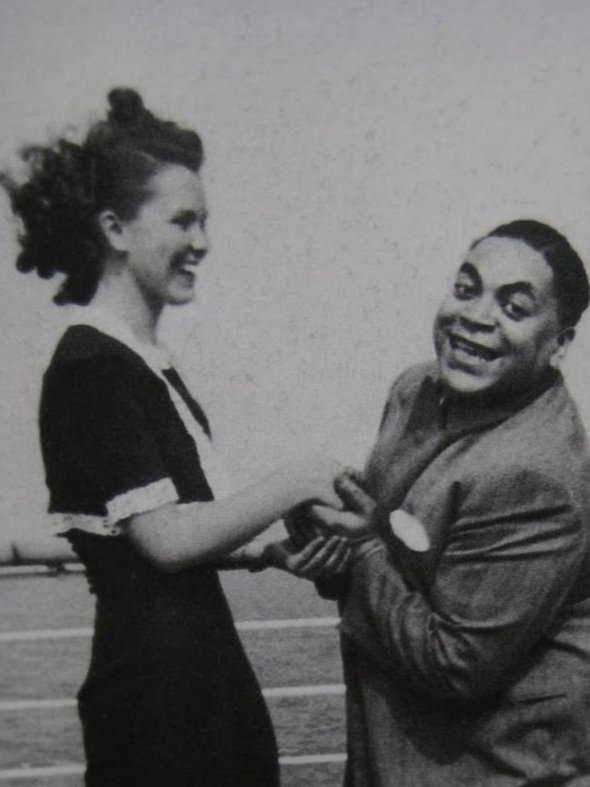
Fats Waller: Baby Elephant Patter
Was Fats Waller put on this earth to send up inane pop songs, or did Tin Pan Alley busy itself churning out an endless supply of vapid tunes just to feed his enormous appetite for ridicule? Either way, it wasn’t a bad deal: while he was irrepressible in his vocal shenanigans and merciless in his mockery of cornball lyrics, Waller also bestowed on assembly-line songs unwarranted beauty. His touch on the piano was like a hummingbird’s wings, like sunlight scattering on moving water. The great clown of jazz, Thomas “Fats” Waller belongs, with Oliver Hardy and Roscoe Arbuckle, to that brotherhood of fat men whose girth serves to counterpoint their buoyant grace and delicacy. His music is at once thundering, voluminous, and dainty, like the “baby elephant patter,” he invokes in “Your Feets Too Big,” or like one of Disney’s hippo ballerinas twirling on pointe.

Jack Black in Hollywoodland
Ex-burglar turned successful author Jack Black would do like so many writers then and now: heed that call and make the lonely journey to Hollywood. Though generally imperturbable after all he’d been through he was perhaps more surprised and pleased, and honest with himself, than most.
After all what are the chances that a three-time loser who copped a twenty-five-year jolt and fully expected to kick behind bars would find himself, after a once-in-a-lifetime jailbird’s appeal that reduced his sentence to a year, working for a San Francisco newspaper and, befriended by its editor, encouraged to write his story for publication. Well? And then a call from a movie studio rep to boot? A shot in the dark, son, and Jack took it by gosh. By the time he published his one and only book, You Cant Win, in 1926 he was about fifty-five years old. He liked to say then that he’d spent fully half his life in the underworld, either on the road, on the lookout, and on the run or else in stir. Now, though still hidden behind his name, a mask he very rarely relinquished no matter the circumstances (even in the upper world to ask would be to invite suspicion; he remained an avowed creature of the night), he was about to embark on the most eventful years of his life in the straight world.
Following the fine notices of his adventure-filled autobiography, in November of 1926 he traveled south from San Francisco to Los Angeles on a leave of absence from his position at the San Francisco Call with the hearty approval of his friend and mentor the fighting editor Fremont Older. The year to come of course turned out to be an eventful one in Hollywood, as silent movies reached their artistic peak and the first so-called talking picture would be released come October 1927.
Jack was employed as a $150-a-week writer on staff at the Metro-Goldwyn-Mayer film studio. In a letter from January of 1927 written on MGM stationery he states that he is presently helping write a prison story and that it is nearly complete. Though no credits have been found* it was not unusual for three, four, half a dozen, or even more writers to be assigned to the same project, frequently simultaneously and working anonymously. Additionally, in the literalist mind of movie producers, hiring an ex-con to write about convicts and prison life is movie common sense, even if you cant use his stuff. (PR will cover his weekly.) Jack may have applied his talents as a scenarist, a dialogue or intertitle writer, or in Fitzgerald’s self-derogatory term a script clerk. (MGM crews at the time were given to likening work in the studio to that, they imagined, of laboring at the jute mill, that is, prison drudgery.)
Irving Thalberg, the skillful young production head of what was by the time Jack arrived the biggest studio in town, was a surehanded and honest to god perfectionist who tinkered knowledgeably behind the scenes in just about every aspect of the making of a picture. One of his projects in the late 1920s was The Big House, set in San Quentin, which wasn’t released, however, until 1930. It reeked of authentic locales and dialogue; his mania for getting things right no matter how many folks he disturbed along the way stands the film in good stead to this day; an Academy Award for writing was presented to the film. This was the kind of venturous man Jack could admire and it’s quite possible he worked under his aegis, if not on this picture per se.

